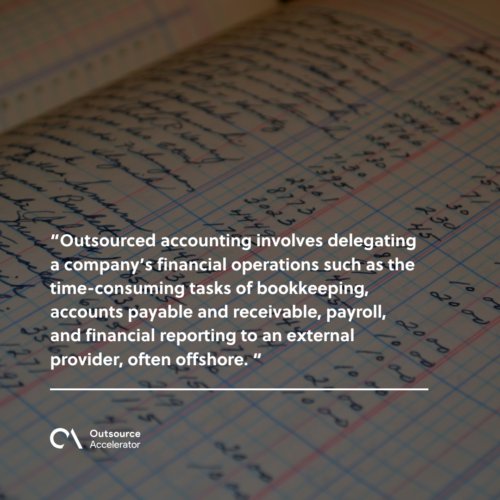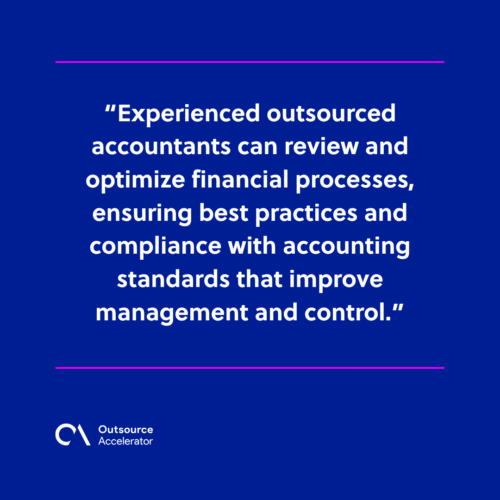Outsourced accounting: A strategic shift for U.S. SMEs in a competitive economy

This article is a submission by Agility Staffing Services LLC. Agility is an offshore staffing provider that operates in the Philippines and, with its sister company Healthscope Services, has over 14 years of experience in building high-performing offshore teams for U.S. clients.
As small and mid-sized enterprises (SMEs) in the United States navigate an increasingly challenging business environment, the adoption of outsourced accounting services is emerging as a significant trend. Choosing to delegate your accounting processes offshore results in cost savings as a welcome bonus.
But more than that, it’s about finding talent that might not be available locally or letting you break away from a perpetual hiring cycle.
This makes your daily operations smoother and helps your company thrive in a rapidly changing world.
What is outsourced accounting?
This involves delegating a company’s financial operations such as the time-consuming tasks of bookkeeping, accounts payable and receivable, payroll, and financial reporting to an external provider, often offshore.
This model allows firms to tap into specialized talent without the need to recruit, train, or maintain a full in-house accounting department. It also frees up owners and decision-makers, as well as their teams to focus on growth and strategy.
Business Insider once featured insights from entrepreneurs and financial professionals who recommend outsourcing accounting and bookkeeping in the early stages of a business.

For instance, in the piece, Robert J. Moore advises, “Early on, outsource to save time and money. If finances are not your core competency, it’s not worth getting lost in the weeds of accounting minutiae…”
Another entrepreneur, David Ehrenberg, adds, “Hiring an interim, outsourced CFO saves on staffing costs while giving you the financial support and assurance you need.”
This was a decade ago and, even then, these decision-makers knew better to reinforce the strategic value of outsourcing financial operations for resource-constrained SMEs. This value has increased today given the economic climate.
The numbers and the economy
In an April 2025 article on Forbes about how the current U.S. administration’s tariffs are impacting small businesses and entrepreneurs, there is clear concern about market volatility.
Furthermore, a foreseen tariff-driven increased cost of production would likely push the growing companies to pass on the cost to their customers.
The article noted that small businesses need “lean operations,” advising them to “adjust your staffing levels to the new reality of uncertainty and stick to key employees in revenue generation.”
A poll conducted by Voice of Main Street between December 4, 2024 to January 22, 2025 among the owners in the Small Business Majority’s national network showed that “53% of small businesses are concerned about tariffs negatively impacting their business and 77% are concerned about announced tariffs negatively impacting the U.S. economy.”
To ride the wave of economic uncertainty, businesses big and small should look for solutions that can realistically cut operational expenses, the biggest of which is people cost.
Outsourcing or offshore staffing is a strategic move that delivers on this. If organizations aren’t ready to move a huge number of company roles abroad, there are pilot programs they can employ, one of them being outsourcing their financial operations to qualified vendors.
How outsourced accounting works
These days, external accounting support services are delivered to clients in two primary approaches:
Full-time offshore teams
This is where companies entrust vendors to build dedicated remote workforce, often by offshoring to regions with lower cost of living but high levels of professional education and experience.
These professionals integrate closely with a business, providing accounting services.
Fractional or on-demand services
Where SMEs can engage CPA-led offshore experts on a flexible basis, scaling services up or down according to business needs, such as during tax season or for specific projects. In this set-up, clients may even be billed by the hour, if needed.
Key benefits of outsourced accounting for SMEs
Partnering with offshore team providers for financial services comes with benefits to your operations.
1. Ensure accurate and timely reporting
It keeps financial data precise and up to date, helping you meet deadlines and avoid costly errors. This accuracy helps firms meet important financial deadlines consistently.
2. Boost operational efficiency
It reduces manual work and lets onshore staff focus on core business tasks. This leads to increased efficiency in financial operations.
3. Optimize financial procedures
Experienced outsourced accountants can review and optimize financial processes, ensuring best practices and compliance with accounting standards that improve management and control.

4. Scale financial team
With access to outsourced specialized accountants with expertise in various financial areas, companies can skip full-time hires and gain flexibility to scale accounting support as needed.
This is particularly useful during audits or when preparing for investor due diligence.
5. Get customized services
Each business has specific needs. Without the need to recruit and put a team together, accounting services from external partners can answer specific requirements from basic bookkeeping to complex financial management, or something in between.
Addressing common concerns in outsourced accounting
Concerns with regards to offshoring can be mitigated by finding a transparent, reliable offshoring partner.
- Data security – Reputable offshore providers invest in robust data protection measures, including ISO certifications and compliance with U.S. standards to safeguard financial information.
- Communication – Countries with high English proficiency, such as the Philippines, have become leading destinations for delegated financial management, minimizing language and communication barriers.
- Transparency and control – Clear agreements and regular reporting maintain transparency and allow business owners to retain oversight, even when financial processes are managed externally.
Real-world impact on businesses
Back in 2022, a survey of 1,003 small US businesses conducted by Clutch said 90% planned to outsource more business functions that year. 27% said they outsource operations such as tax services and accounting to concentrate on their core business.
A Baker Tilly report published on Bloomberg.com said that business owners spend 70% of their time on operational matters rather than on revenue generators.
In a January 2024 article published by Forbes, Forbes Financial Council’s Mike Ford says finding staff for finance functions within corporate America has become exceedingly difficult.
He cited a 2022 study by Robert Half that showed 91% of senior managers “found it challenging to find skilled finance and accounting talent” in areas that outsourced accounting can readily answer.
We can only see this trend holding given what’s happening across the globe.
For U.S. SMEs today, the real opportunity in outsourced accounting transcends a tactical fix. It gives executives the chance to rethink how their companies grow.
It gives leaders and teams the space to adapt and drive forward with the kind of focus that lets them seize opportunities rather than just survive uncertainties.
At a time when agility has become crucial, letting go of the routine could be your smartest move yet.







 Independent
Independent




